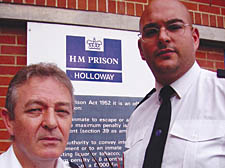|
|
 |
| |

Union officials Bill Banham and Simon Peter |
Inside Holloway: ‘violent women inmates attack staff once a week’
Prison officers claim that gang culture among young offenders is fuelling disorder
PRISON officers at Holloway have revealed how they have to deal with increasingly aggressive women inmates, in an exclusive interview with the Tribune this week.
Union officials are threatening more industrial action following the recent national one-day strike, the first in the prison service’s history.
In the interview, they criticised TV presenter Joan Bakewell, who has called for the majority of women prisoners to be released.
And on a lighter note, the officers admitted enjoying ITV’s Bad Girls, which they think occasionally presents an authentic message about life in a women’s prison.
The officers maintain that, with an average of one attack a week on staff at Holloway, many women today are becoming as aggressive as men and need to be locked up for society’s good.
Bill Banham, 55, local branch secretary of the Prison Officers Association (POA), believes that the inmates now in Holloway Prison� reflect an increasingly violent society.
However, although he described conditions at the women’s prison as difficult, with one officer to 15 inmates, he praised the new governor, Sue Saunders, who was working well with the unions.
Last Thursday – the day of the interview – an officer was assaulted after trying to break up a fight between two prisoners. “One of the officers tried to intervene and unfortunately she got struck with a broom handle across her neck,” Mr Banham said.
The officer, who was not seriously hurt, was sent to Whittington Hospital in Archway for a check-up.
But Mr Banham said he did not expect the assault� to be investigated by prison authorities.
“Police and nurses have a zero tolerance on assaults but we are treated like third-class citizens,” he said. “When a prison officer is attacked no one is interested.”
On the other hand, he added, when a prisoner alleges assault by an officer that is usually thoroughly investigated.
“That is entirely fair,” he said. “We don’t want officers attacking inmates. But it should work both ways.”
TV presenter Joan Bakewell caused a nationwide debate last year when she called for women’s prisons such as Holloway to be closed and the inmates freed.
She argued that the majority of women prisoners are not violent criminals but inside because of unfortunate domestic circumstances or drug abuse.
Mr Banham said: “Unfortunately, these days more and more, particularly young, women are quite capable of committing violent crimes.
“We’ve noticed that with our young offenders there is a gang culture and they are very prone to violence.
“Women generally are becoming more violent but in prison it becomes more pronounced. There are women who kill and they have to go somewhere.”
POA branch chairman Simon Peters, 33, said that the layout of the 150-year-old prison, partly rebuilt in 1976, makes it difficult to patrol.
“We don’t have CCTV,” he added. “The cost would be prohibitive, and there are so many nooks and crannies that it would make a system difficult to work.”
With an average salary of about £25,000 a year, the majority of officers cannot afford to live locally and have to commute long distances.
Mr Peters added: “It means we have a big recruitment problem.”
On average there is a suicide every two years in Holloway Prison.
Mr Peters said: “But we will have possibly two or three episodes of self-harm a day. We may lose one woman every two years but we have probably saved the lives of thousands over that period.”
Despite the problems, the officers are proud of Holloway’s many achievements. “Many prisoners are able to kick drugs and learn to lead a more civilised life while inside,” Mr Peters said. “Our staff don’t just supervise prisoners, they invest time and energy in counselling, talking and encouraging those who want to lead a normal life.
“The tragedy is that when they return to society there is no support or care for ex-offenders. It is something that the probation service should provide, but they too are increasingly having their staff and funds reduced.” |
 |
|
| |
| Your Comments: |
| |
| |
| |
|
 |
|